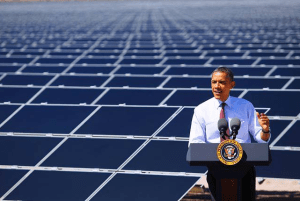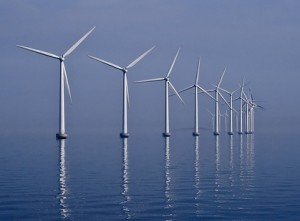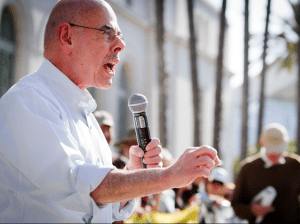We have much more to do and your continued support is needed now more than ever.
The Top 10 Climate Successes of 2013
We’ll remember 2013 as a year of climate action thanks in large part to one landmark announcement: President Obama’s plan to act on climate. National Wildlife Federation has been a key player in fights to keep pollution from fossil fuels out of the atmosphere, from Northeast tar-sands pipelines to the Pacific Northwest coal exports, and everywhere in between. As we move into 2014, we know that we still have a lot of work to do, but let’s take a minute to celebrate the successes we saw in 2013. Here are the top 10 climate wins for 2013!

1. President Obama announces climate plan
In June, President Obama announced his plan to tackle climate change, addressing specifically the need for power plant carbon pollution limits and a committed engagement with the international community on climate issues. He also committed the federal government to lead by example with ambitious renewable energy goals. This climate plan is an exciting and important step in ensuring that the U.S. is a leader on addressing climate change.
2. The EPA rolls out a plan to cut carbon from power plants
The Environmental Protection Agency (EPA) began to take steps to address one of the most important pieces of the President’s plan: establishing carbon pollution limits for power plants. NWF, along with other organizations, worked to make sure that every voice was heard through public comments and hearings. The majority of those who came out to testify were in favor of the carbon rules, outnumbering industry supporters 2:1, and they voiced personal concerns about climate change impacting their communities and families.

3. Offshore wind takes off in the Atlantic
While there is still no operational offshore wind project in America, there is certainly momentum in that direction. In 2013, the Bureau of Ocean Energy Management held two competitive lease auctions in southern New England, and Virginia and just recently announced a third auction in Maryland this week. Ground broke at on New Bedford’s port terminal—the first in the nation equipped to deploy offshore wind power infrastructure. The University of Maine deployed a model floating turbine, the first grid-connected turbine in U.S. waters. All of this, coupled with President Obama’s commitment in his June climate speech to double renewable energy development on public lands, bodes well for off shore wind energy in 2014.
4. Obama issues an executive order addressing climate preparedness
This year, President Obama released an executive order on climate preparedness to accelerate national efforts to plan for intensifying droughts, floods and storms, sea level rise and other climate change impacts. This executive order established the Task Force on Climate Preparedness and Resilience which is a group of state, local and tribal leaders that advises the Administration on how the Federal Government can respond to the needs of communities. Climate change is already a problem that is presenting challenges nationwide. National Wildlife Federation has been a key organization emphasizing the importance of resiliency for the protection of communities and wildlife habitat.
5. Another year without the Keystone pipeline
They say no news, is good news. 2013 marks the fifth year without the proposed Keystone XL pipeline, a disruptive project to extract dirty tar sands from Alberta, Canada. This year, President Obama clearly defined the terms on which he would approve the pipeline: only if it does not significantly exacerbate the issue of climate change. It is evident that Keystone pipeline does cause major impacts to the climate and the continued delay of the pipeline verdict shows just how important and crucial this decision is. Hopefully, in 2014, Obama will make the right decision and reject the Keystone pipeline.
6. Stopping coal exports in the Pacific Northwest

7. The Northeast fights tar sands
In 2013, NWF was on the frontlines of a hard-fought battle: keeping tar sand out of the North East. There was a huge grassroots effort to protect South Portland, Maine waterfront from oil industry tar sands projects. After the oil industry poured out whopping $172 a vote, they were able to secure a very narrow victory on a vote to protect the waterfront area. However, that doesn’t mean tar sands will be coming to Portland anytime soon, the Portland City Council recently passed, by a vote of 6-1, a temporary moratorium on exporting tar sands out of South Portland which is much a testament to the hard work of grassroots voices and efforts of local community members. Also this year, NWF filed a rule-making request asking for the development of standards for tar sands pipelines, which was supported by over 50 co-petitioners. There was a DC fly-in where pipeline land owners and community leaders met with their congressional delegations to talk about the tar sands threat to their communities and the states’ wildlife. All of this activity has been supported by amazing grassroots voices, as shown at the Portland rally, and through a record high number of online engagements.

8. February sees the largest climate rally ever
This year, we participated in the largest climate rally in U.S. history, where over 35,000 people journeyed to Washington, D.C. on a freezing President’s Day weekend to show their commitment to tackling the threat of climate change. National Wildlife Federation members and other supporters urged the President to stand on the right side of history on the Keystone pipeline decision and to lead national efforts to combat climate change. This rally united conservationists from across the country, with different backgrounds and concerns, around a key point- we need to act on climate. While the fight is certainly far from over, this rally served as an example of the vast commitment and solidarity for action on climate.
9. International conference establishes rules against deforestation
This fall was the 19th Conference of Parties (COP) to the United Nations Framework Convention on Climate Change (UNFCC) in Warsaw, Poland, attended by National Wildlife Federation and a variety of other organizations. While governments were not able to come to an agreement that sufficiently addressed the dangers of climate change, there was significant progress made by establishing definite rules against deforestation. Deforestation is a major contributor to climate change as it releases stored carbon into the atmosphere and establishing international regulations will help to mitigate climate change by keeping that carbon in the ground.
10. Senator Whitehouse and the Safe Climate Caucus speak up

for climate
Since the founding of the Safe Climate Caucus in February, the over 30 congressional members spoke on climate change every day and in early December, they hit their 100th day of speeches. Lead by chair Rep. Henry Waxman (D- CA), the caucus spoke out to “break the conspiracy of silence and denial that exists in the House”. Senator Sheldon Whitehouse (D-RI) was another climate leader, giving 50 climate speeches in 50 weeks, where each week he addressed the Senate to urge climate action. These congressional voices are influential in the climate fight and are important in ensuring that climate issues are not ignored in Congress
![]() You can help us continue the fight in 2014. Please consider donating to protect our communities and wildlife from dirty fuels and support renewable energy and resiliency efforts.
You can help us continue the fight in 2014. Please consider donating to protect our communities and wildlife from dirty fuels and support renewable energy and resiliency efforts.





















